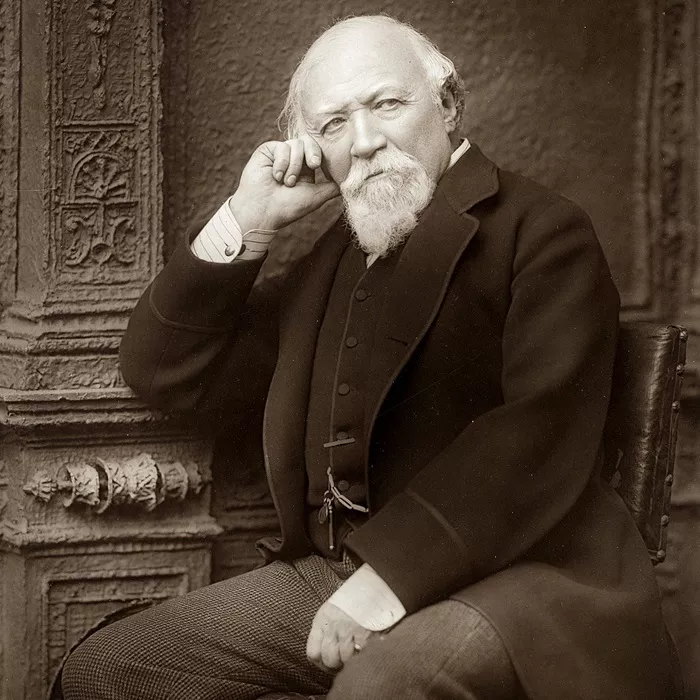
Robert Browning (1812–1889) is one of the most significant Victorian poets, renowned for his mastery of dramatic monologue and psychological complexity. His works explore themes of love, morality, and human ambition, often delving into the darker recesses of the human psyche. With masterpieces like My Last Duchess and The Ring and the Book, Browning’s influence on English poetry remains profound and enduring.
Robert Browning Biography
Robert Browning was born on May 7, 1812, in Camberwell, London, into a family that valued literature and learning. His father, a clerk in the Bank of England, amassed an impressive library of over 6,000 books, which became a significant influence on the young poet’s intellectual growth. Browning displayed an early love for poetry and began writing verses by the age of 12.
Although he briefly attended the University of London, Browning’s education was largely self-directed. He immersed himself in history, philosophy, and languages, which enriched his later works. His early poetry, including Pauline (1833) and Paracelsus (1835), revealed his ambition but received limited recognition.
Browning’s breakthrough came with Dramatic Lyrics (1842), a collection that included My Last Duchess and Porphyria’s Lover. These poems introduced the dramatic monologue, a form he would master and popularize, offering readers a glimpse into the thoughts and emotions of his speakers.
In 1846, Browning married Elizabeth Barrett, a prominent poet in her own right. Their elopement and subsequent life in Italy were marked by deep love and mutual literary influence. Elizabeth’s death in 1861 devastated Browning but also marked a period of renewed creative vigor.
Browning’s greatest work, The Ring and the Book (1868–1869), a 12-book poetic epic based on a 17th-century Italian murder trial, solidified his reputation. Its intricate narrative and psychological depth showcased his ability to explore multiple perspectives on truth and morality.
Though often overshadowed by his wife during their lifetime, Browning’s popularity grew steadily after her death. He became a celebrated literary figure, receiving numerous honors, including an honorary degree from Oxford University.
Browning died on December 12, 1889, in Venice, Italy, the same day his final volume, Asolando, was published. He was buried in Westminster Abbey’s Poets’ Corner, a testament to his stature as one of England’s literary giants.
Robert Browning Poems
Robert Browning’s poetic oeuvre is marked by its dramatic intensity and intellectual complexity. Below are some of his most notable works:
1.“My Last Duchess”
This iconic dramatic monologue explores themes of power, control, and jealousy through the voice of a Duke revealing his dark nature while describing a portrait of his late wife.
2.“Porphyria’s Lover”
A chilling exploration of obsessive love and madness, this poem uses vivid imagery to depict a lover’s descent into violence.
3.“The Pied Piper of Hamelin”
A narrative poem that retells the German legend of the Pied Piper, blending whimsy and dark moral undertones.
4.“Rabbi Ben Ezra”
A philosophical meditation on faith, aging, and the purpose of life, this poem reflects Browning’s interest in religious and existential themes.
5.“Andrea del Sarto”
In this dramatic monologue, Browning gives voice to the Renaissance painter Andrea del Sarto, exploring themes of artistic compromise and unfulfilled potential.
6.“Childe Roland to the Dark Tower Came”
A haunting and allegorical narrative poem, it depicts a knight’s quest through desolation, filled with rich symbolism and psychological depth.
7.“Evelyn Hope”
This poem contemplates unrequited love and the hope for eternal connection, showcasing Browning’s romantic sensitivity.
8.“Fra Lippo Lippi”
A lively dramatic monologue in which a 15th-century monk and painter reflects on art, religion, and human desires.
9.“The Ring and the Book”
This sprawling epic examines a murder trial through multiple perspectives, offering profound insights into truth, justice, and human motivations.
10.“Pippa Passes”
A dramatic poem following the journey of an innocent girl whose simple songs inadvertently influence the lives of others, encapsulating Browning’s belief in the power of goodness.
Browning’s ability to create compelling, multifaceted characters and delve into the intricacies of their minds remains a hallmark of his poetry.
Robert Browning Quotes
1.“A man’s reach should exceed his grasp, or what’s a heaven for?” (Andrea del Sarto)
2.“Grow old along with me! The best is yet to be.” (Rabbi Ben Ezra)
3.“God’s in His heaven, all’s right with the world.” (Pippa Passes)
4.“Ignorance is not innocence but sin.” (The Inn Album)
5.“Who hears music feels his solitude peopled at once.” (Balaustion’s Adventure)
6.“I count life just a stuff to try the soul’s strength on.” (In a Balcony)
7.“The moment eternal—just that and no more.” (Now)
8.“What’s done, is done; and as I’ve had my say, I’ll go my way.” (The Laboratory)
9.“Tis not what man Does which exalts him, but what man Would do!” (Saul)
10.“Take away love, and our earth is a tomb.” (Paracelsus)
Robert Browning Facts
Robert Browning was largely self-taught, mastering multiple languages, including Greek, Latin, and Italian.
He was deeply influenced by the Romantic poets, particularly Percy Bysshe Shelley.
His marriage to Elizabeth Barrett Browning is considered one of the great literary romances.
Browning perfected the dramatic monologue, a form in which a speaker’s character and story are revealed through their speech.
He lived in Italy for 15 years, where he wrote some of his most celebrated works.
The Ring and the Book was inspired by an old book of Italian court records he found in a Florence market.
Browning faced early criticism for his obscure style but later became a revered poet.
He was an atheist in his youth but later explored themes of faith and redemption in his works.
His dramatic poem Pippa Passes introduced the famous line, “God’s in His heaven, all’s right with the world.”
Browning’s final collection, Asolando, was published on the day of his death in 1889.
